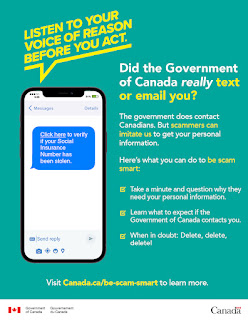How to protect yourself from fraud & scams?
Unfortunately, seniors are more vulnerable to becoming scam or fraud victims. SInce Covid-19, they have been targeted with additional scams.
Seniors are often selected because they usually have good credit, own a home or condo, have savings, and are trusting. They also are selected because of age-related weaknesses such as:
Loneliness & Isolation
Depression
Poor financial situation
Being financially insecure and looking for good fortune
Insecurities related to health, cognitive or social status
Age-related brain changes/cognitive changes & general health decline affect memory in many ways. A senior might not remember or recognize their family and or not be aware of their financial status due to Dementia and or Alzheimer’s.
Adult children can be of help to seniors who don't suffer from cognitive decline by expressing their concern. This way is more effective than educating a parent about fraud & scams. Seniors deserve respect and don't want to be parented and feel controlled.
A gentle way to ask the parent or loved one to always be alert on the phone, monitor their mail and email if they are computer savvy.
Advise the senior to never:
share any personal, financial & password information!
open any unfamiliar or unsolicited emails and attachments!
click on any links which are included in unknown or suspicious emails!
Age-related brain changes/cognitive changes & general health decline affect memory in many ways.
A senior might not remember or recognize their family and or not be aware of their financial status due
to Dementia and or Alzheimer’s.
Adult children can be of help to seniors who don't suffer from cognitive decline by expressing their concern.
This way is more effective than educating a parent about fraud & scams.
Seniors deserve respect and don't want to be parented and feel controlled.
A gentle way to ask the parent or loved one to always be alert on the phone, monitor their mail and
email if they are computer savvy.
Advise the senior to never:
share any personal, financial & password information!
open any unfamiliar or unsolicited emails and attachments!
click on any links which are included in unknown or suspicious emails!
Phishing emails are scams to obtain your personal or financial information or both under the disguise of
a recognized institution or company. Always inspect the URL.
Such an email may claim that you need to update your account or that your tax refund is ready or a
well-known charity asking for donations. Go directly to your accounts and don't click on any links.
Some scammers even use health organizations including the World Health Organization to supposedly
alert you to COVID-19 exposure and ask you to download important information.
It can even be Covid-19 vaccine-related! It is crucial to ask yourself if the email you have received is
from a familiar or unexpected source prior to opening it.
How do you ensure that the email sender is not a fraudster and the email is legitimate?
Do you recognize the sender’s name, email address, or phone number?
If yes- still look closer! Is the sender:
requesting your personal/confidential and financial information?
asking you to click on a link or download information?
making an urgent request with a deadline
Promoting an offer too good to be real?
2. Do you notice: any disguised or incorrect links in the email
The URLs of phishing are slightly altered so be very careful!! Look out for poorly written emails containing many spelling errors.
If you receive any concerning phone, mail, or email notifications from companies or government agencies about your accounts, log directly into your accounts to verify.
In phone calls, ask security questions that a fraudster would not be able to answer.
When online shopping, verify your seller and look for customer reviews first before providing any financial information.
Below is an important link from the Government of Canada on avoiding phishing scams:
https://cyber.gc.ca/en/guidance/dont-take-bait-recognize-and-avoid-phishing-attacks
For more helpful info on fraud & scams on seniors, pl. check out RCMP’s Seniors Guidebook to Safety & Security on the Seniors First BC website:
Have you become a feud or scam victim? Below is some helpful guidance:
https://seniorsfirstbc.ca/news/what-to-do-if-youve-fallen-victim-to-a-scam/






Comments
Post a Comment